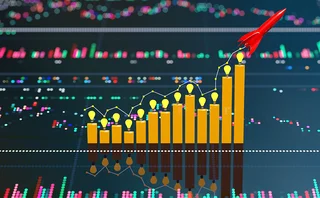
UBS: an FX beacon in a sea of doubt
The bank topped 14 out of the 23 currency categories - 10 wins ahead of second place winner the Royal Bank of Scotland - demonstrating that it continues to be a foreign exchange power house.
The past year's turbulent market conditions have cut across all derivatives markets, with FX options being no exception (page 2). In an interview with Risk, Fabian Shey, global co-head, forex and money markets at UBS in London said liquidity has dried up in the derivatives market over recent months. He said more and more banks are declining to quote in forex options, but added that there has also been a lot of client interest. "In our role as a bank market maker, things have become a little tougher because the liquidity has dried up to a certain extent and banks are declining to quote," he said.
He did however add that as forex is not an inventory business, it tends, as a result, to benefit from market crises and market volatility, as that increases client interest in it. "Banks with a client-driven forex business model will have benefited as long as they have the market-making franchise that can withstand this level of dislocation, uncertainty and volatility."
It should be interesting to see how the past 12 months have affected the leader board of the annual FX Week Best Bank survey, which concluded last Friday. Results will be announced at the awards dinner in London on November 18.
Comments? please email
saima.farooqi@incisivemedia.comLetter to the editor: I saw the Aite report last week. The numbers are out. A pure algo trader pays lower prime brokerage fees than they suggest and piggybacks off CLS volume benefits from their bank - thus also paying a bit less than stated. Flex? True - they were multiples higher but have cut costs ... but then why would an algo trader use Flex when they can get aggregated direct market access from a bank for free? ECN fee? For low volumes ... maybe the Aite number is right. But any reasonable algo trader will be paying less. Algo execution from the banks? Usually in pips not US dollars, and Aite are too high again - though they are right that the market is split between those who believe in the stat analysis that proves the worth of algo execution, and those who prefer picking up the phone and getting a rate. Prime brokerage fees vary from US$2.50 to US$12 - but the upper end is only for very high-touch clients with complex needs. Algo traders are down at the $3 or $4 level. As CLS has volume thresholds, the more you do the cheaper it is. So algo trades can help reduce the overall bill of the CLS clearer - and they can thus be much cheaper. Then the US$1 ECN fees are similar to prime brokerage - $2 to $15 in the extreme - but algos are again at the very low end. Algorithmic execution offered by banks is charged in fractions of a pip - as the purpose is to improve execution rates ... and thus fractions of a pip is more relevant. The numbers currently being used are several times higher than Aite stated. Name withheld |
Only users who have a paid subscription or are part of a corporate subscription are able to print or copy content.
To access these options, along with all other subscription benefits, please contact customer services - www.fx-markets.com/static/contact-us, or view our subscription options here: https://subscriptions.fx-markets.com/subscribe
You are currently unable to print this content. Please contact customer services - www.fx-markets.com/static/contact-us to find out more.
You are currently unable to copy this content. Please contact info@fx-markets.com to find out more.
Copyright Infopro Digital Limited. All rights reserved.
As outlined in our terms and conditions, https://www.infopro-digital.com/terms-and-conditions/subscriptions/ (point 2.4), printing is limited to a single copy.
If you would like to purchase additional rights please email info@fx-markets.com
Copyright Infopro Digital Limited. All rights reserved.
You may share this content using our article tools. As outlined in our terms and conditions, https://www.infopro-digital.com/terms-and-conditions/subscriptions/ (clause 2.4), an Authorised User may only make one copy of the materials for their own personal use. You must also comply with the restrictions in clause 2.5.
If you would like to purchase additional rights please email info@fx-markets.com
More on Algorithmic Trading
FX automation: mission incomplete?
This FX Markets webinar delves into the evolution of FX trading desks, the challenges to automating trade workflows, and what vendors and liquidity providers are doing to address this
Technology trends in capital markets: transforming the sell-side FX front office
The capital markets landscape is witnessing a technological revolution – a wave transforming the sell-side FX front office. Firms such as smartTrade Technologies are at the forefront of this transformation, leveraging technologies such as artificial…
Vanguard: automation is great until it doesn’t work
Andy Maack, head of FX trading, talks about the future of trading, algos and diversity
BidFX eyes expansion in execution tools and algos
Buy-side focus on FX exposure will drive development
Artificial intelligence in FX ‘may be hype’
Relevance for AI in foreign exchange does not stack up compared with other classes
Algo adoption at inflection point, driven by buy side
Usage in FX is rising, but there are inherent limitations to overall take-up
JP Morgan traded $250 billion via NDF algos this year
A fifth of all the NDF algo volumes conducted by JP Morgan’s clients is being internalised
Tradepoint onboards 10 streaming NDF providers for broken dates
The firm sees greater use of algos to trade NDFs in increasingly electronified market







